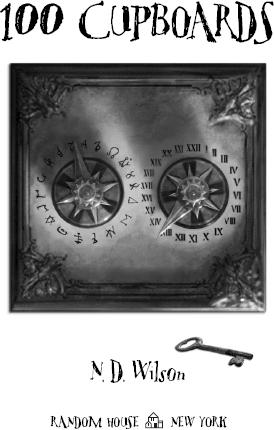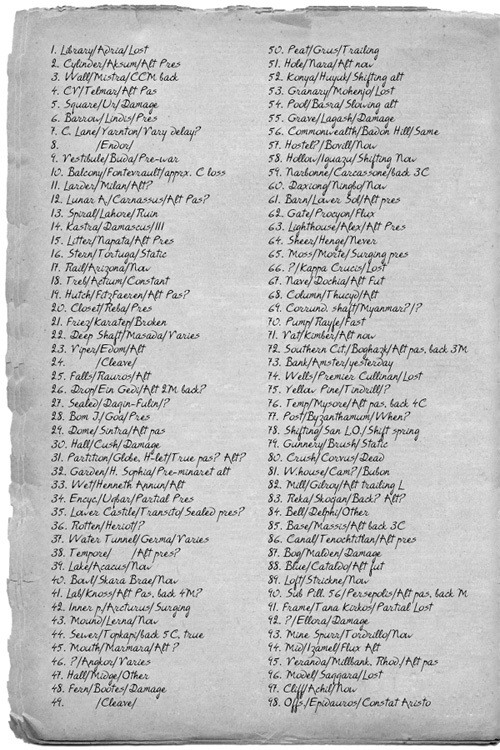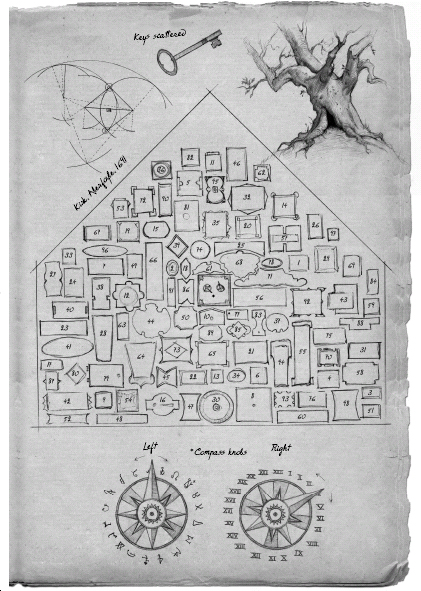100 Cupboards



Contents
For my grandfathers:
Lt. Col. Lawrence Aubrey Greensides, USAF (Ret.),
and
Lt. James Irwin Wilson, USN (Ret.),
who tilled the soil of my imagination


CHAPTER ONE

Henry,
Kansas, is a hot town. And a cold town. It is a town so still there are times when you can hear a fly trying to get through the window of the locked-up antique store on Main Street. Nobody remembers who owns the antique store, but if you press your face against the glass, like the fly, you'll see that whoever they are, they don't have much beyond a wide variety of wagon wheels. Yes, Henry is a still town. But there have been tornadoes on Main Street. If the wind blows, it's like it won't ever stop. Once it's stopped, there seems to be no hope of getting it started again.
There is a bus station in Henry, but it isn't on Main Street. It's one block northâthe town fathers hadn't wanted all the additional traffic. The station lost one-third of its roof to a tornado fifteen years ago. In the same summer, a bottle rocket brought the gift of fire to its restrooms. The damage has never been repaired, but the town council makes sure that the building is painted fresh every other year, and always the color of a swimming pool. There is never graffiti. Vandals would have to drive more than twenty miles to buy the spray paint.
Every once in a long while, a bus creeps into town and eases to a stop beside the mostly roofed, bright aqua station with the charred bathrooms. Henry is always glad to see a bus. Such treats are rare.
On this day, the day our story begins, bus hopes were high. The Willis family was expecting their nephew, and the mister and missus stood on the curb waiting for his arrival.
Mrs. Willis couldn't hold nearly as still as the town. She was brimful of nervous energy and busily stepped on and off the curb as if she were waiting for the bus to take her off to another lifetime of grammar school and jump rope. She had planned to wear her best dress on principleâit was the sort of thing her mother would have doneâbut she had no idea which of her dresses was best, or how to begin the selection process. It was even possible that she didn't have a dress that was best.
So she had remained in her sweatpants and T-shirt. She had been canning in her kitchen and looked pleasant despite the faded teal of her pants. Her face was steam-ruddied and happy, and her brown hair, which had originally been pulled back into a ponytail, had struggled free. On this day, if you got close enough, as her nephew would when hugged, she smelled very strongly of peaches. She was of medium build in every direction, and she was called Dotty by her friends, Dots by her husband, and Mrs. Willis by everyone else.
People liked Dotty. They said she was interesting. They rarely did the same for her husband. They said Mr. Willis was thin, and they didn't just mean physically. They meant thin everywhere and every way. Dotty saw much more than thin, and she liked him. Frank Willis didn't seem to notice much of anything beyond that.
Mrs. Willis stopped her stepping and backed away from the curb. Something was shimmering on the highway. The bus was coming. She nudged Frank and pointed. He didn't seem to notice.
The Henry on the bus was not a town in Kansas. He was simply a twelve-year-old boy on a slow bus from Boston, waiting to meet an aunt and uncle he had not seen since the age of four. He was not looking forward to reuniting with Aunt Dotty and Uncle Frank. Not because he in any way disliked them, but because he had led a life that had taught him not to look forward to anything.
The bus stopped amid a shower of metallic grunts. Henry walked to the front, said goodbye to a talkative old woman, and stepped onto the curb into a lungtaste of diesel. The bus lurched off, the taste faded, and he found that he was being held tight by someone rather soft, though not large, and the smell of diesel had been replaced by peaches. His aunt held him back by the shoulders, her smile faded, and she became suddenly serious.
“We are both so sorry about your parents,” she said. She was diligently eye-wrestling him. Henry couldn't quite look away. “But we are very happy you're going to be staying with us. Your cousins are all excited.”
Someone patted Henry on the shoulder. He looked up.
“Yep,” Uncle Frank said. He was watching the bus march out the other end of town. “The truck's over here,” he added, and gestured with his head.
Uncle Frank carried Henry's duffel bag while Aunt Dotty escorted him to the truck, one arm tightly wrapped around his shoulder. It was an old truck. A few decades earlier, it may have been a Ford. Then it had been donated as a shop-class project to Henry High. Uncle Frank bought it at an end-of-the-year fundraiser. The paint was scum brown, the sort that normally hides at the bottom of a pond, attractive only to leeches and easily pleased frogs. The class had not been able to afford the bigger wheels they had dreamed of, so they had simply lifted the truck body as high as the instructor would allow. The overall effect was one of startling ricketiness. Henry's bag was thrown into the truck bed.
“Hop in,” Uncle Frank said, and pointed in the back. “The tailgate doesn't drop, so just stand on the tire there and hoick yourself over. I'll boost you a bit.”
Henry stood on the tire and teetered for a moment, trying to get one leg over the edge of the truck bed. Uncle Frank pushed him from behind, and he tumbled in onto his side.
Henry had never ridden in the back of a truck before, and he had always assumed it was illegal, though on the one trip his parents had taken him on, a tour of early Southwestern settlements, he had seen an entire truckload of field workers drive by. As he had been strapped into a car seat in the back of a Volvo at the time, he was extremely jealous. Only a few miles later, he had learned to his surprise that nine-year-old boys do not usually ride in car seats. A laughing school bus full of children taught him the lesson at a stoplight.
Henry perched himself on one of the truck's wheel wells and prepared for a spiritual experience. The engine fired its way into life, Frank forced reluctant metal gears together, and Henry slid off the wheel well into the truck bed as Henry, Kansas, swirled through his hair. They drove one block before the truck shifted its weight in the saddle and muscled around a right turn. Henry slipped onto his back and spread-eagled so he wouldn't roll. Two blocks later, the truck bounced hard, and gravel rattled in the wheel wells like gunshots. Henry watched a rooster tail of dust climb into the sky behind the truck, and he tried to keep from banging his head every time the truck hopped a pothole. Eventually Uncle Frank stopped with a strong pull on the emergency brake, and Henry slid headfirst into the back of the cab. He picked himself carefully up onto all fours and peered at a pale blue house that he vaguely remembered. Aunt Dotty was grinning at him in the side mirror, pointing at the house and waving.
The house seemed big, and an even bigger barn hulked behind it. A mostly white cat sprawled in the yard, looking revolted by something or other. Old leaded-glass windows lined the first floor, a row of small windows the second, and one big, round window perched up in the eaves. On the front porch, below a long row of green-tarnished wind chimes, three girls stood staring at him.
Â
Henry sat on the wood floor with his back to a wall. The three girls sat facing him, all cross-legged. They were in the attic. The whole room was open. The walls coved, and an old rail guarded the top of some very steep stairs. Henry was looking to his left, out the big, round window at the far end, trying to avoid staring at his cousins as much as they were staring at him. To Henry's right, at the other end of the attic, a pair of small doors led into a space that was no longer the attic closet and was now Henry's bedroom. Uncle Frank had apologized for the size and pointed out, before Aunt Dotty threw an elbow to his ribs, that if Henry's parents were never heard from again and Henry had to live with them always, they would go ahead and knock the wall down and expand his room a bit.
Henry had thanked him.
“I'm Anastasia,” the smallest girl said.
“I know,” said Henry. She was the youngest, small and wiry for a nine-year-old. And freckled. Her hair was brown, but Henry thought it looked like it wanted to be red.
“Then how come you didn't say âHello, Anastasia' right off? Were you just being rude?”
“Hush,” the oldest girl said.
Anastasia wrinkled her lip. “If you knew I was Anastasia, then what are their names?”
Henry looked to the oldest girl. Her straight, nearly black hair hung loose past her shoulders. She smiled at him.
“Penny,” Henry said. He turned to the third girl, who had thick brown curls and green eyes. “And Henrietta.”
Henrietta was staring at him. Henry looked away. He suspected he had done something rather awful to Henrietta's cat on his last visit. Suddenly the memory appeared vividly in the foreground of his mind and danced an emphatic jig. He turned red and Anastasia started talking again.
“What's Penny
stand
for?” she asked, narrowing her eyes.
Penny smiled and pulled her crossed legs tighter. “It doesn't stand for anything, Anastasia.”
“It stands for Penelope,” Anastasia insisted.
“Doesn't it, Henry?” Henry shrugged, but Anastasia wasn't looking at him. She was looking at Henrietta.
Henrietta ignored her.
“No,” Penny said. “It's
short
for Penelope, it doesn't
stand
for it. Standing for something is when you just do initials.”
Henry tried to catch Henrietta's eye. “Do they call you Henry?” he asked.
“Yes,” Henrietta said. Henry watched her jaw clench. “I don't like it,” she added.
“Henrietta's too long,” Anastasia said.
Henry thought for a moment. “It's no longer than Anastasia.” He double-checked the syllables in his head. “Yeah.”
“For a while I wanted to be called Josephine, but then they just called me Jo.” Henrietta looked at Henry. “Will you call me Beatrice?”
“Um, sure,” Henry said.
“We'll call you Beat,” Anastasia said, smiling.
“No, you won't,” Henrietta said. “Not if you want to keep your teeth.”
“Stop it,” Penny said. “Why don't we just call you Henrietta? Now that
he's
here, we can't call you Henry.”
Henrietta considered this option. She looked at Henry. She seemed to want him to agree.
“Okay,” Henry said. They were silent again, and Henry's thoughts wandered back through his tour of the house.
The revolted catâone of the girls had called him Blakeâhad quickly disappeared while Aunt Dotty led Henry onto the porch and very helpfully said, “Henry, you remember the girls.”
Henry had then been attached to a human train, one back from the engine, on a high-speed tour of the house. He had seen sofas, gifts from dead great-aunts, lamps that didn't work, treasures acquired by Uncle Frank on the Internet (including a fish fossil now being used, uniquely and quite cheaply, Dotty pointed out, as an end table). Fingers pointed down the stairs into a dark basement. Various artistic pieces were highlighted, all produced by Frank and the girls. Aunt Dotty had laughed and called them “especially local artists.” Henry was shown the junk drawer, containing a small flashlight, a box of rubber bands, and a sedimentary layer of pens, pencils, paper clips, glue, and a plastic box with a picture of the ocean on its lid. He had seen the toilet, been shown the plunger, and heard of the plumbing trouble. He had been told to hold still and listen to see if the fridge would make its funny noise. It hadn't, but he had been warned that he would know when it did. And on the big second-story landing, there had been the door to the room at the front of the house. Henrietta had called it Grandfather's room, but no one had gone near it. Every other door in the house, every cabinet, every drawer, and every cupboard, had all been opened. But not that one.
Henry's mind snapped back. He was still on the floor in the attic. The girls had not yet grown weary of him and departed.
“Henry?” Anastasia said. “Henry, do you think your parents are going to die?”
Penny shot an eye-rebuke in her sister's direction, but it went unheeded. Henrietta and Anastasia were staring at Henry. Henrietta began twisting her hair.
Anastasia leaned forward. “Zeke Johnson's dad got killed by a combine.”
“Stop it!” Penelope said. “If you don't want to talk about it, Henry⦔
“Penelope likes Zeke,” Anastasia said. Henrietta laughed.
Penelope darkened. “Everyone likes Zeke,” she said.
Anastasia looked right into Henry's eyes. “He goes up to the graveyard by himself,” she said. “And he pitches baseballs at his dad's gravestone.”
Penelope crossed her arms. “Mr. Simon told him to write his dad a goodbye letter and he didn't want to. So he pitched to him instead.”
“I don't want to talk about Zeke,” Henrietta said. “Penny always talks about Zeke. I want to hear about Uncle Phil and Aunt Ursula.”
“Do you think they're going to die?” Anastasia asked again.
